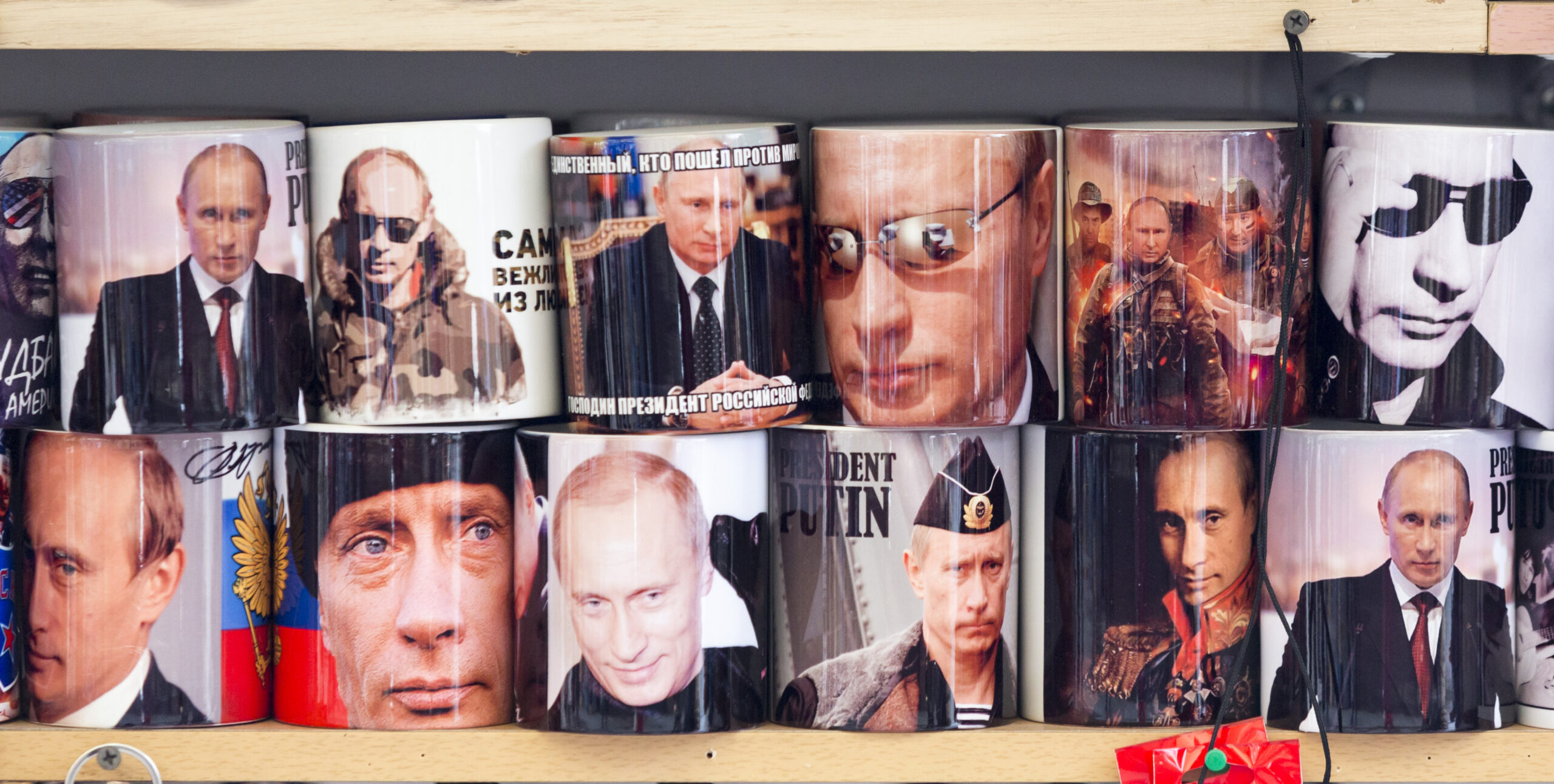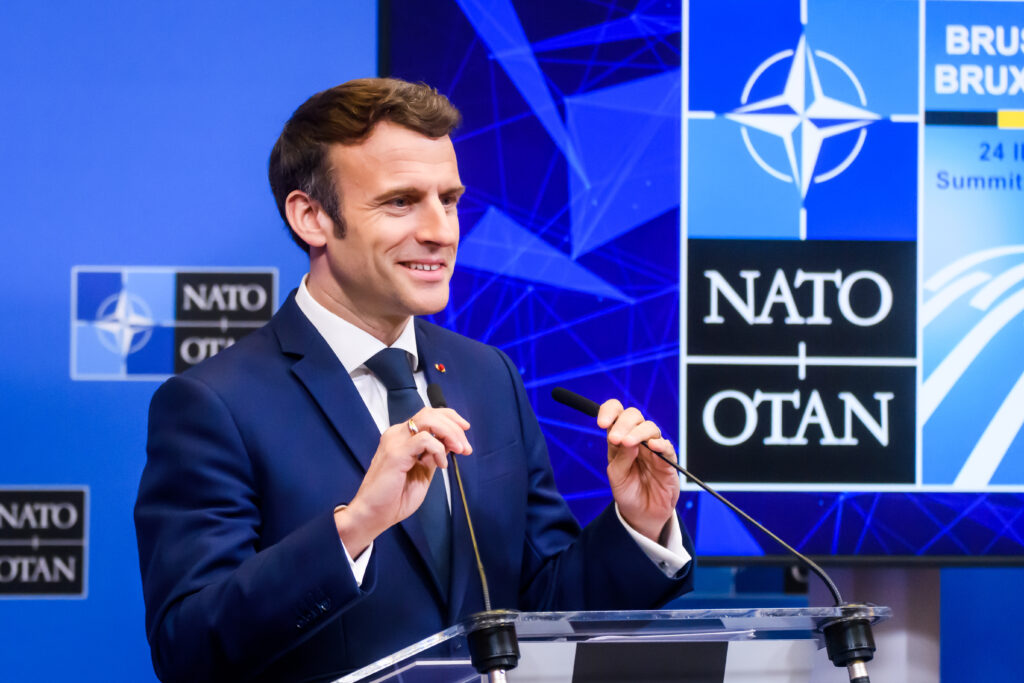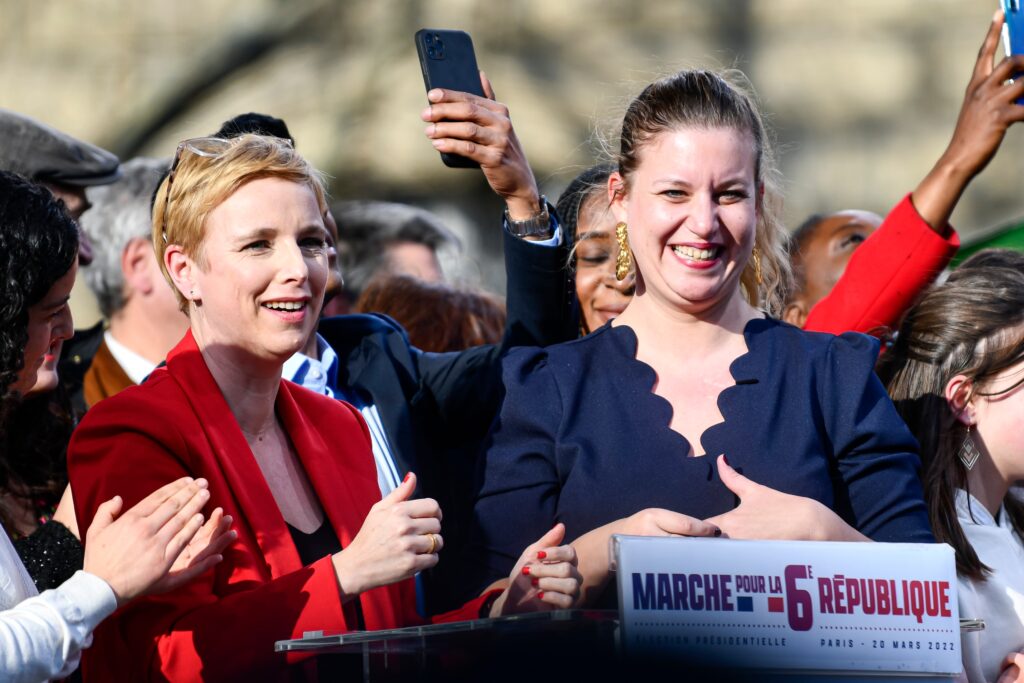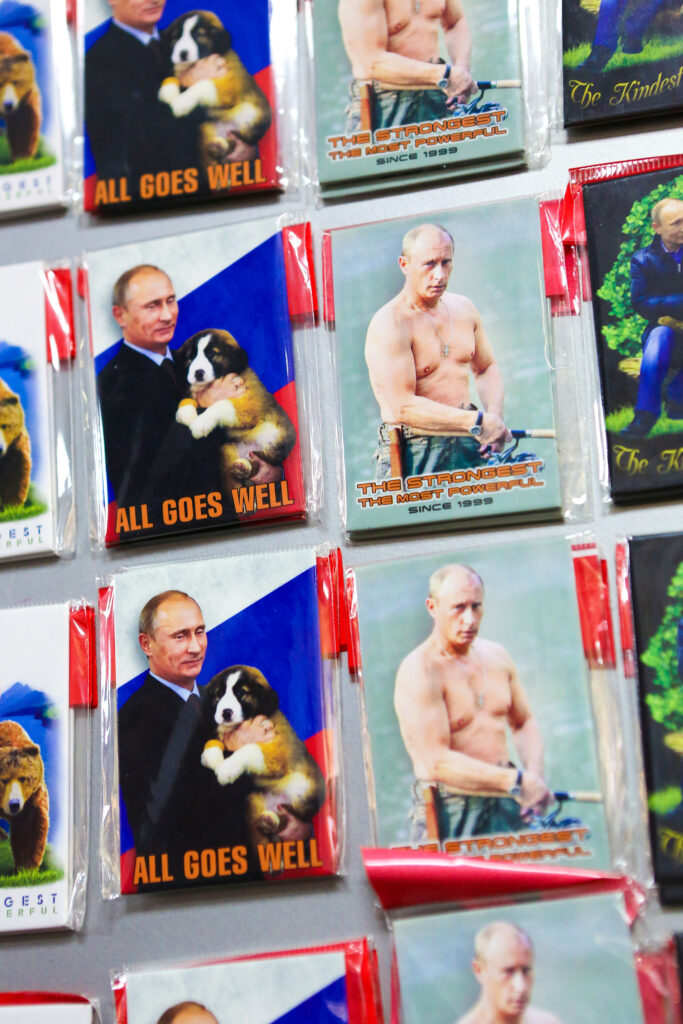Ukraine, One Year Out: Two Voices

The first voice is that of Emmanuel Macron, recently re-elected President of France. The second is that of Clémentine Autain, Deputy of the radical Left party La France Insoumise for Seine-Saint-Denis since 2017, member of the commission of Foreign Affairs in the National Assembly.
Macron:

President Emmanuel Macron, in attendance at this year’s recent Munich Conference, stated firmly that Russia must not win the war.
On the other hand . . .
On the presidential plane home, he gave an interview to three journalists from Le Journal du Dimanche, Le Figaro, and FranceInter. Le JDD summed up his major points in this way: “neither of the two camps can carry the day entirely and the Europeans will be the principal victims of a conflict without end.”
Macron, it appears, still believes in a diplomatic solution that would have Putin across the table from Zelensky. “I want the defeat of Russia in Ukraine,” he stated, “and I want Ukraine to be able to defend its position, but I’m convinced that in the end this won’t conclude [by military means]. I don’t think, as some do, that it’s necessary to defeat Russia completely, to attack her on her soil. These observers want above all to destroy Russia. That has never been the position of France and never will be.” He was referring, said LeJDD, to the eastern members of the European Union and NATO, who were angry when he had said, back in June, “‘It is necessary not to humiliate Russia’–meaning that it is a matter of doing everything to bring Vladmir Putin to the negotiating table, once Ukraine, massively aided by the West, will be sufficiently in a position of strength to make its conditions.”
He seemed to be using “humiliate” and “defeat,” and “Russia” and “Putin” interchangeably. (An editorial in L’Express at the time suggested that this “humiliation” remark was the sort of thing he should have kept to himself, noting that it was “in reality playing the game of the Kremlin.”[1]
Macron also seemed to see no chance for a democratic solution, or a “regime change,” to emerge in Russia itself; Putin would likely continue in power, he added, noting that “all the options other than Vladimir Putin at the center of the current system seem worse.” He seemed to be alluding to the head of the Wagner group, Evgeny Prigozhin, or Nikolai Patrouchev, chief of the Russian Security Council. LeJDD again: “Macron thinks that Vladimir Putin, with all the faults we know about, [nevertheless] has the capacity to present as a victory what would in fact be a concession at the end of eventual negotiations, and that he could remain master of a state weakened, precarious, but stable.” In other words, Putin could “sell” whatever the outcome might be, promoting whatever “victories” he might achieve–and the suggestion is that he would have to get something–as major accomplishments, worth all the blood and tears.
Macron, as if making excuses for Putin, then said that the allies had not always been so “clear in their intentions” in the expansion of NATO–which explained Putin’s speeches and actions since his 2007 “violently anti-Western” speech at that year’s Munich Conference.
Since Russia attacked Ukraine, those who are vaguely anti-Western and/or vaguely pro-Putin–the “yes, but” people–have relied on these central arguments:
- Putin was unquestionably to blame for starting this war, and is to be condemned for continuing it. Words cannot be harsh enough.
- The war must stop. It is too violent, too damaging to the people of both countries. Both sides must get to the negotiating table.
- Russia’s legitimate security concerns–which, it is asserted, is all Russia ever wanted–must be taken into account.
Unfortunately, Macron is not just anyone; and his desire to be the “Putin whisperer,” his apparent inability to get off the phone–he and Putin had nineteen phone calls from December 2021, to March 29, 2022, and the twentieth in early May–was time-consuming and, in the end, deeply unsuccessful.[2] (Excerpts from one of these calls, made just before the war began, were recorded by filmmaker Guy Lagache, and were part of a film, titled Un président, l’Europe, et la Guerre, broadcast on June 30, 2022, on France2.) [3] There was another call on August 19, 2022, and according to the Elysée readout this one had a serious purpose, as Macron persuaded Putin to agree to sending IAEA experts to the Zaporizhzhia nuclear power plant, which Russia had bombed.[4]
De Gaulle’s strategy of becoming a third force (through Europe) and a “mediator” during the Cold War has clearly influenced Macron’s determination, evidenced early in his first term, to be on better terms with Russia. But also present is an extreme personalization of the conflict and an unconscious conflation of Russia with Putin. The 70-year-old Putin will not be around forever; the Russian population, subject to the intense propaganda against Ukraine, will have to come to terms, eventually, with the brutality of this war carried out in their name; and the world will have to find a way to deal with this pathology.
*******
Autain:

The other voice is that of Deputy Clémentine Autain. She comes from the generally anti-West, anti-US La France Insoumise, led by Jean-Luc Mélenchon, who has called for France to align itself with emerging nations (BRICS, or Brazil, [Russia], India, China, South Africa–in other words, with those countries who are liberating themselves, both economically and politically, from Western hegemony). In a recent editorial in Le Journal du Dimanche, Autain broke out of that position in a creative way that nevertheless preserved the essence of her party’s orientation against neoliberal globalization (to use a description made trite by overuse, but nevertheless accurate).
She began by dismissing the call for negotiations to end the war: “The appeal for negotiations between Russia and Ukraine, which I myself brandished as a reflex, is at first thought seductive. But let us be aware that, since the Crimean war in 1856, no war has been stopped by negotiations between the two parties who confront each other. And especially, does one sincerely imagine a diplomatic face-to-face between Vladimir Putin and Volodymyr Zelensky?”
She recommended two essential actions: helping the Ukrainians to hold the line militarily by supplying weapons; and increasing international pressure, without falling into a familiar “Russia against the West” pattern. “To begin with, let us remember: [Putin’s act] is a violation of international law in the service of an imperialist and reactionary project. We have not wanted to see it coming; since the annexation of the Crimea in 2014, since the brutal intervention in Syria, we should have taken Putin’s plans more seriously. To affirm his political power inside Russia, the strong man of the Kremlin utilizes a fearful idea: to restore Russian power by surfing on nostalgia for Imperial Russia, based on xenophobia and heightened virility.”

But Kyiv held, and it was clear almost immediately that the Russian army had failed. Putin had responded by “social terrorism,” including war crimes.
His next stage, she predicted, would be to present himself to the “Global South” as a “victim” of the “Atlantic hegemon,” to invite those nations to join with him against imperialism. The importance, for the west, she wrote, was to break out of the Cold War mentality and call upon Lula’s Brazil, the African Union, China (still “ambiguous” in its attitude), and others; and to come down hard on the side of the rule of international law and justice.
How we get to this point of effective pressure from outside the West is not clear; many hopes rested on President Lula of Brazil, who is still talking about negotiation. (The Biden administration has tried to go in this direction. Lula’s recent trip to Washington resulted in a joint statement about the shared “January 6” threat to democracy in both countries, and climate change, with not a word about the conflict; indeed, in an interview with CNN, Lula stated that “We need to find interlocutors who can sit with President Putin to show him the mistake he made to invade Ukraine’s territory, and we have to show Ukraine that they need to talk more so we can end this war.” White House national security spokesman John Kirby said in response that the US government believed that “Mr. Lula’s view did not reflect the current state of the war.” [5]
But in addition to pointing to the need to break out of an East-West dichotomy, Autain also recognizes that the war is not just about Putin and his feelings. Putin has created a sick society, cut off from information, mobilizing the population around xenophobia and grievance; how easy, then, to take on the role of victim–as indeed, he has already done. The “exaggerated virility” (the accompaniment to increased attempts, in the United States especially, to control women’s bodies) has to be recognized as a part of this sickness; we’ve seen the same extreme gender role prescriptiveness in both Nazi Germany and Fascist Italy. And finally, instead of arguing, as many still do, about what was said or not said in 1991 about the expansion of NATO, she recognizes this conflict for what it is: an exercise in imperialism.
=============================================
[1] Lalanne and Cyrille Pluyette, “‘Ne pas humilier la Russie’: pourquoi Macron aurait mieux fait de se taire,” L’Express, June 6, 2022. https://www.lexpress.fr/monde/europe/ne-pas-humilier-la-russie-pourquoi-macron-aurait-mieux-fait-de-se-taire_2174742.html)
[2] Giorgio Leali, “Macron, Putin resume phone contact but remain far apart on Ukraine War,” Politico, May 3, 2022. https://www.politico.eu/article/macron-putin-resume-phone-contact-but-remain-far-apart-on-ukraine-war/
[3] Ariane Chemin and Philippe Ricard, “Face à Vladimir Poutine, Emmanuel Macron manie la diplomatie des ‘fuites,’” Le Monde, June 30, 2022. https://www.lemonde.fr/international/article/2022/06/30/face-a-vladimir-poutine-emmanuel-macron-manie-la-diplomatie-des-fuites_6132651_3210.html
[4] https://www.elysee.fr/en/emmanuel-macron/2022/08/19/telephone-conversation-with-the-president-of-the-russian-federation-mr-vladimir-putin (In English)
[5] Jack Nicas, “Brazil says it won’t be sending weapons to Ukraine, despite a U.S. push for more support for Kyiv,” The New York Times, Fabruary 10, 2023. https://www.nytimes.com/2023/02/10/world/europe/brazil-lula-weapons-ukraine.html. The White House read out: https://www.whitehouse.gov/briefing-room/speeches-remarks/2023/02/10/remarks-by-president-biden-and-president-lula-da-silva-of-brazil-before-bilateral-meeting/
The interview with Macron: François Clemenceau, “Emmanuel Macron sur l’Ukraine: ‘Écraser la Russie, cela n’a jamais été la position de la France,’” Le Journal du Dimanche, February 18, 2023. https://www.lejdd.fr/international/emmanuel-macron-sur-lukraine-il-ne-faut-pas-ecraser-la-russie-132795?xtor=EPR-19-%5Bquotidienne%5D
Clémentine Autain’s editorial: “Tribune, Clémentine Autain: “Pour que Poutine abandonne sa guerre en Ukraine,” Le Journal du Dimanche, February 24, 2023. https://www.lejdd.fr/international/tribune-clementine-autain-pour-que-poutine-abandonne-sa-guerre-en-ukraine-132947?at_creation=NL_Chez_Pol__2023-02-24&at_campaign=NL_Chez_Pol&at_email_type=acquisition&at_medium=email&actId=ebwp0YMB8s1_OGEGSsDRkNUcvuQDVN7a57ET3fWtrS_ZkZTnx4BH9A-oj-p5tnfc&actCampaignType=CAMPAIGN_MAIL&actSource=523109
Header Photo by Photo 62966326 © Belish | Dreamstime.com; Putin mugs on sale for tourists in St-Petersburg, 2015.